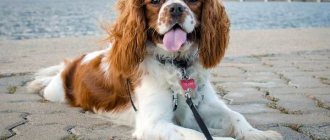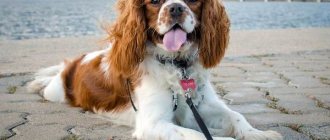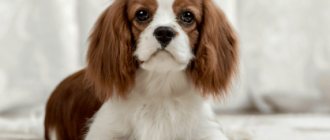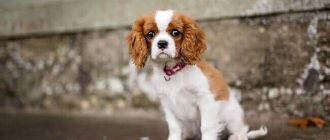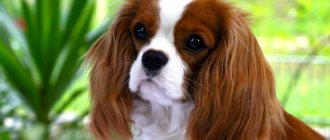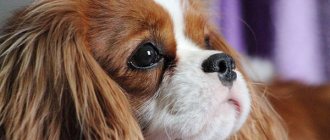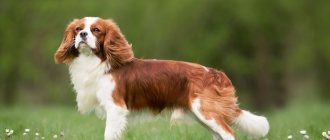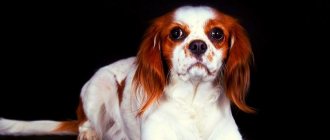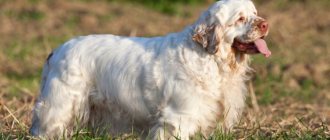Below is a preliminary schedule of special breed exhibitions of Cavalier King Charles Spaniels for 2022, which was formed on the basis of applications submitted through the official portal RKF.Online until April 30 in strict accordance with the Regulations on certificate exhibitions of the RKF.
Features and description
The Cavalier King Charles Spaniel cannot be called homely She is bright, pretty and memorable. Most owners of such an animal literally dote on it. And this is not surprising. It has an attractive charisma. It is interesting that despite the dog being classified as a spaniel, it is completely devoid of hunting potential.
Aggression is not characteristic of him, as well as well-developed observation and a sense of suspicion. Also, the dog cannot boast of excellent adaptation skills. At first glance, it may seem that these are its shortcomings. In fact, dogs without developed working abilities are excellent companions.
Being close to the owner is the main desire of the Cavalier King. He quickly finds a common language with the person who adopted him, as he is characterized by contact and sociability. He happily gets along not only with the owner-leader, but also with other people. He is very happy when guests come to the house.
The dog's homeland is England. Several centuries ago, only aristocrats could afford to have one. Today the situation is the opposite. Yes, a representative of the breed can hardly be called a cheap pet, but it is accessible to everyone.
Breeders insist that he was bred by crossing Pugs with Spitz and Maltese dogs. It's hard to argue with this, because the standardized Charles King does have the genetic traits of all these dogs. He has established himself as a noble and respectable dog. The mistresses of such a favorite often invited artists to the house so that they could depict them on canvas.
The advantage of such a dog was that it always had a calm disposition and could easily sit on its owner’s legs for several hours. The artist did not have to be angry because the pose of the sitters often changed and he had the opportunity to complete the work on time.
The largest population of such dogs is in the USA. There they were especially loved by retired women. The modern representative of the breed is a frequent guest at exhibitions of decorative dogs, as well as at other events dedicated to animals.
Breed standard
Since royal English families in the 18th and 19th centuries regularly kept Cavalier King Charles Spaniel dogs at court, the behavior of these animals became appropriate. There is no rush or fussiness in their gait, but rather calmness and relaxation.
The representative of the breed is sophisticated and delicate. They classify him as a small dog whose weight should not exceed 7.5 kg. The height at the withers of the dog is from 26 to 30 cm. She has a compact build. The case format is rectangular. Despite having rather short legs, the animal runs quickly, like all representatives of the spaniel group.
His back is very strong and powerful. The strength of these dogs should not be underestimated. They are really hardy. There are no bulges on the body. The lumbar region is poorly expressed. The neck is short, withers are present.
The stomach is tucked up and does not sag. The joints on the paws are well defined, especially the knees. Tail set high. The dog is small, but very fluffy. Against the background of the compact physique, the dog’s head especially stands out.
The forehead line is clearly visible, the skull is convex. Visual feature - the nose at the edge of the muzzle is slightly turned up. Pigmentation is dark. The Charles Spaniel's eyes are large, often with black irises. There are long whiskers on the edge of the dog's muzzle. The huge floppy ears give the breed a special charm. By the way, they have a low rise.
The Cavalier King Charles Spaniel in the photo is a smart, interested and proud dog who will take an interest in everything that happens in the world. He is quite active, inquisitive and purposeful. Such pets have a special charisma, so they always attract attention.
He has straight, long hair, which must have a natural shine. It forms a bright “collar” on the chest. On the ears, back and tail - the longest. Such a dog should not have curls, but on long and large ears the fur may curl slightly.
Popular colors:
- Black, white and red.
- Dark tan.
- Pure brown.
- Black-brown.
- White chocolate.
Individuals with a light shade of fur must have a white spot on the edge of the muzzle. This is an important standardized requirement.
Cavalier King Charles Spaniel: Specialty Shows for 2022
| Club | City | start date | expiration date | RANK |
| MROO SFLS | Barnaul | 17.09.2022 | 17.09.2022 | KCHK |
| BGOO “KSILS” | Biysk | 28.05.2022 | 28.05.2022 | not a member of the NKP |
| Youth "AMIGO" | Bulatnikovskoe | 24.09.2022 | 24.09.2022 | KCHK |
| “ROYAL CLUB” | Vladivostok | 06.05.2022 | 07.05.2022 | not a member of the NKP |
| EYE “DISCOVERY” | Vladivostok | 08.10.2022 | 08.10.2022 | KCHK |
| POOLS | Vladivostok | 28.05.2022 | 28.05.2022 | refusal at the request of the NCP |
| VOOO “KCC” | Voronezh | 25.12.2022 | 25.12.2022 | KCHK |
| VROO “KOiSS” | Voronezh | 23.10.2022 | 23.10.2022 | not a member of the NKP |
| SC “AGE OF AQUARIUS” | Vyborg | 27.08.2022 | 27.08.2022 | KCHK |
| IOO KLZH SIBIRYAK | Gorno-Altaisk | 26.08.2022 | 26.08.2022 | not a member of the NKP |
| SR OO KLS “EXOTICA” | Ekaterinburg | 24.04.2022 | 24.04.2022 | KCHK |
| MOO “KF Volga Federal District” | Izhevsk | 10.06.2022 | 10.06.2022 | KCHK |
| IGOO “ANGARA” | Irkutsk | 20.11.2022 | 20.11.2022 | not a member of the NKP |
| IGOO OLS “LEADER” | Irkutsk | 14.08.2022 | 14.08.2022 | not a member of the NKP |
| NGO “KENOLOGICAL ACADEMY OF KAZAN” | Kazan | 16.10.2022 | 16.10.2022 | KCHK |
| OO KG CLZ “FAUNA” | Kazan | 27.11.2022 | 27.11.2022 | not a member of the NKP |
| ROO “KSS RT” | Kazan | 12.03.2022 | 12.03.2022 | not a member of the NKP |
| ROO UNION OF CYNOLOGISTS VYATKA | Kirov | 17.09.2022 | 17.09.2022 | not a member of the NKP |
| KKKOO “KENINE CLUB “CITY OF DOGS” | Krasnodar | 26.11.2022 | 26.11.2022 | not a member of the NKP |
| KKKOO “KENINE CLUB “CITY OF DOGS” | Krasnodar | 04.06.2022 | 04.06.2022 | not a member of the NKP |
| KKKOO “KENINE CLUB “FLAGMAN” | Krasnodar | 26.11.2022 | 26.11.2022 | not a member of the NKP |
| KKKOO “KENINE CLUB “FLAGMAN” | Krasnodar | 04.06.2022 | 04.06.2022 | not a member of the NKP |
| CCOO CC “TOP DOG” (HIGH DOG) | Krasnodar | 05.02.2022 | 05.02.2022 | not a member of the NKP |
| ROO “PKKTS” | Kungur | 25.06.2022 | 26.06.2022 | not a member of the NKP |
| COOCO “KURGAN-GRAD” | Mound | 01.10.2022 | 01.10.2022 | not a member of the NKP |
| LGOO “LGKLZH “ETOLOG”” | Lipetsk | 14.08.2022 | 14.08.2022 | not a member of the NKP |
| LO OO CC | Lipetsk | 30.07.2022 | 30.07.2022 | not a member of the NKP |
| MCOO “KRAFT” | Moscow | 24.12.2022 | 24.12.2022 | not a member of the NKP |
| MCOO “Nika” | Moscow | 16.07.2022 | 17.07.2022 | not a member of the NKP |
| MCOO “NKP AMERICAN COCKER SPANIEL” | Moscow | 14.08.2022 | 14.08.2022 | KCHK |
| MCOO “NEW CLASSICS” | Moscow | 30.01.2022 | 30.01.2022 | not a member of the NKP |
| MCOO “OZONE” | Moscow | 04.09.2022 | 04.09.2022 | KCHK |
| MCOO “ORPHEUS” | Moscow | 16.07.2022 | 16.07.2022 | KCHK |
| MCOO “PROFESSIONAL” | Moscow | 30.01.2022 | 30.01.2022 | not a member of the NKP |
| MCOO VICTORIA | Moscow | 19.02.2022 | 19.02.2022 | KCHK |
| LLC “GLOBUS PLUS” | Moscow | 28.08.2022 | 28.08.2022 | not a member of the NKP |
| MOO “PEDIBAL DOG BREADING CLUB “RED MAYAK” | Moscow | 19.11.2022 | 19.11.2022 | not a member of the NKP |
| LLC “TOI AND COMPANION DOGS” | Moscow | 04.11.2022 | 04.11.2022 | not a member of the NKP |
| MOOC OLYMPUS | Moscow | 26.03.2022 | 26.03.2022 | KCHK |
| MR OO OLS “IDEAL” | Moscow | 03.04.2022 | 03.04.2022 | not a member of the NKP |
| NKP “RUSSIAN DOBERMAN CLUB” | Moscow | 03.04.2022 | 03.04.2022 | not a member of the NKP |
| LLC “KINOLOGICAL CENTER “ELITE” | Moscow | 08.01.2022 | 09.01.2022 | not a member of the NKP |
| RCOO “RUSSIAN STANDARD” | Moscow | 06.11.2022 | 06.11.2022 | not a member of the NKP |
| ROO “KK “PLANET OF SOBAK” | Moscow | 28.05.2022 | 28.05.2022 | PC |
| ROO “CLS “GOLDRISE” | Moscow | 29.05.2022 | 29.05.2022 | KCHK |
| ROO “ANIMAL LOVERS CLUB “FAVORITE” | Moscow | 27.03.2022 | 27.03.2022 | KCHK |
| ROO “OK “LEADER” | Moscow | 26.02.2022 | 26.02.2022 | not a member of the NKP |
| ROO MKK “GRAND PRIX” | Moscow | 12.02.2022 | 12.02.2022 | KCHK |
| ROO CLZH “LEADER AND PRESTIGE” | Moscow | 13.03.2022 | 13.03.2022 | not a member of the NKP |
| DPCC “WESTLITS” | Murmansk | 12.03.2022 | 13.03.2022 | KCHK |
| OO MOCC FRIEND | Murmansk | 09.04.2022 | 09.04.2022 | not a member of the NKP |
| NOOO KLZ “FORTUNA” | Nizhny Novgorod | 02.07.2022 | 02.07.2022 | KCHK |
| NGOO “KINOLOGISTS CLUB “ELITE” | Novorossiysk | 03.09.2022 | 03.09.2022 | KCHK |
| UNGKLV “FAUNA” | Novorossiysk | 21.08.2022 | 21.08.2022 | not a member of the NKP |
| NGOO ZOO CENTER “PRESTIGE” | Novosibirsk | 03.12.2022 | 03.12.2022 | refusal at the request of the NCP |
| NGOO ZOO CENTER “PRESTIGE” | Novosibirsk | 22.01.2022 | 22.01.2022 | KCHK |
| ROO OKPTS FAVORITE | Omsk | 29.05.2022 | 29.05.2022 | KCHK |
| OOPC ANIMAL LOVERS CLUB “LUKOM” | Permian | 17.09.2022 | 17.09.2022 | not a member of the NKP |
| ROO CS PC | Permian | 05.02.2022 | 05.02.2022 | KCHK |
| MCOO “TRAIL” | Podolsk | 27.02.2022 | 27.02.2022 | KCHK |
| SKMKO | Rostov-on-Don | 29.05.2022 | 29.05.2022 | KCHK |
| OO KSS RiRMRYAO | Rybinsk | 30.07.2022 | 31.07.2022 | KCHK |
| JLLC “IMAGE DOG” | Samara | 05.02.2022 | 05.02.2022 | not a member of the NKP |
| SPB ROO “KK “ELITA” | Saint Petersburg | 23.04.2022 | 23.04.2022 | KCHK |
| SPB ROO “KLZh “ALLEN” | Saint Petersburg | 20.02.2022 | 20.02.2022 | KCHK |
| SPB ROO “PCC “OLIMP” | Saint Petersburg | 22.10.2022 | 22.10.2022 | KCHK |
| SPb ROO KK TRIUMPH | Saint Petersburg | 10.07.2022 | 10.07.2022 | not a member of the NKP |
| SPBROO “KPC “SIRIUS” | Saint Petersburg | 04.06.2022 | 04.06.2022 | not a member of the NKP |
| SPBROO CLS “SPARS” | Saint Petersburg | 19.11.2022 | 20.11.2022 | refusal at the request of the NCP |
| SPBROO CLS “SPARS” | Saint Petersburg | 02.04.2022 | 03.04.2022 | KCHK |
| OOMRKLSK “ZOO CENTER” | Saransk | 07.08.2022 | 07.08.2022 | not a member of the NKP |
| OOMRKLSK “ZOO CENTER” | Saransk | 06.03.2022 | 06.03.2022 | not a member of the NKP |
| SROO LPS “Zoosphere” | Saratov | 24.09.2022 | 24.09.2022 | KCHK |
| ROO PCS SEVASTOPOL | Sevastopol | 24.04.2022 | 24.04.2022 | not a member of the NKP |
| SEVASTOPOL ROO “SKS GRAND” | Sevastopol | 17.04.2022 | 17.04.2022 | refusal at the request of the NCP |
| NGO CLZ “OSIRIS” | Serpukhov | 28.05.2022 | 28.05.2022 | not a member of the NKP |
| TROO KLOSPOIR ZARYA | Tambov | 04.09.2022 | 04.09.2022 | KCHK |
| TROO KK “CHAMPION” | Tobolsk | 22.07.2022 | 22.07.2022 | not a member of the NKP |
| TROO KK “CHAMPION” | Tobolsk | 25.02.2022 | 25.02.2022 | not a member of the NKP |
| TGOOLS “A ELITE” | Tula | 10.12.2022 | 10.12.2022 | KCHK |
| “KINOLOGICAL ASSOCIATION “AKINAK” LLP | Tula | 24.04.2022 | 24.04.2022 | not a member of the NKP |
| TOOLZH | Tyumen | 10.12.2022 | 11.12.2022 | KCHK |
| ROO CHRKS | Cheboksary | 04.06.2022 | 04.06.2022 | refusal at the request of the NCP |
| ROO CHRKS | Cheboksary | 05.02.2022 | 05.02.2022 | KCHK |
| MCOO “MIRD” | Chelyabinsk | 17.07.2022 | 17.07.2022 | KCHK |
| MCOO “EURYDICE” | Chelyabinsk | 17.07.2022 | 17.07.2022 | not a member of the NKP |
| MOOC “STAR OLYMPUS” | Chelyabinsk | 02.10.2022 | 02.10.2022 | not a member of the NKP |
| Private Limited Liability Company “Chokss” | Chelyabinsk | 27.08.2022 | 28.08.2022 | not a member of the NKP |
Kinds
This representative of the breed is often confused with his closest brother, the King Charles Spaniel. The separation of the 2 species of these dogs occurred in 1945. It is worth noting that most breeders to this day do not support such a decision. They have a well-founded argument - dogs of both breeds are not much different from each other. Their dimensions and character are almost identical, so there is no good reason to separate them.
Diseases and health problems
Dogs of this breed can live 10 - 12 years on average - a normal period for small breeds. Since the original group that served to develop the breed was small, the hereditary defects inherent in any of them were inherited by many descendants - this phenomenon is known as the “founder effect”.
A heart problem in particular that is all too common in Cavaliers is mitral valve degeneration (MVD). This is the leading cause of premature death in pets. More than half of dogs over 5 years old suffer from this disease and almost all dogs after 10 years. This is 20 times more common than other breeds.
Important fact: When the mitral valve degenerates, heart failure occurs, which leads to fatigue, shortness of breath, increased blood pressure, and pulmonary edema. Cavaliers should be examined by a cardiologist at least once a year, especially since they may have other heart problems.
Another popular disease in Cavaliers is syringomyelia (SM): the formation of fluid cavities inside the spinal cord. Causes neuralgic pain in the neck and chest, the dog becomes restless, lies in an unnatural position, or itches. The reason is considered to be a shortened skull and a violation of the ratio of its parts and brain size, which appeared during selection.
A unique gene mutation causes a specific neurological disorder called episodic falls syndrome. It manifests itself as attacks of “muscle contraction” in different situations. The disease is detected in a genetic test. It was discovered that tricolors carry the vicious gene much more often than cavaliers with even colors.
Also found:
- Hip dysplasia is a congenital disease of different breeds;
- Dislocation of the kneecap;
- Visual impairment: cataracts and retinal dysplasia;
- Hearing impairment, which is common to all spaniels.
Character
Formidable watchman, ferocious hunter, observant bodyguard - these are epithets that describe working dogs, of which the Cavalier King Charles Spaniel is definitely not included. The nature of the dog in question is exclusively “domestic”, a little pampered and even vulnerable. He can be called a loyal friend to all family members, but as a guard or hunter he is ineffective.
Such a pet is a good companion. It’s a pleasure to spend time with him, anywhere: at home in an apartment, in the yard, outdoors or in a store. By the way, it is great for exhibition events. The dog is photogenic and artistic.
Finding herself the center of attention of a large group of people, she becomes excited and becomes more active, winning the attention of more and more spectators. So as a show dog, a representative of the breed is an excellent option.
She is unlikely to become a nanny for children, since she does not have a high level of responsibility, like, for example, a golden retriever. She will probably be offended if one of the kids gets too excited and hurts her. But, due to the natural lack of anger, he definitely won’t attack. He gets along well with middle-aged children, loves to play tag with them or run after the ball they throw.
There is often a sense of aristocracy in the behavior of this animal. It can be stubborn, especially if it was offended by something the day before. Many people associate this character trait of a dog with the difficulties associated with its training. This is partly true.
Since Charles King is characterized not only by pride, but also by laziness, he may simply not want to learn to follow commands. May growl or strike with teeth if very irritated. But such behavior is very rare for him.
If treated well and affectionately, the dog will be sweet, gentle and very friendly. Moreover, such a kind attitude on his part extends not only to the owners, but also to strangers. The dog is not at all aggressive, so he loves when strangers come into the house.
But excessive pride does not allow her to vigorously express positive emotions at the sight of guests. First, the dog will calmly approach the person who comes in, sniff him, and only then make a warm acquaintance if he doesn’t mind. This is a very calm creature that can not only run around the room playing, but also rest quietly in the middle of the day.
He loves when a person takes him in his arms. Can fall asleep on his feet. The dog is ready to fight for the owner’s attention around the clock. Trying to attract his gaze, he may even do mischief, for example, pull away the car keys or chew his shoes. He gets very upset if the owner is indifferent to him. Distressed by separation from their loved ones, Cavalier Kings even refuse to eat.
Care and maintenance
This dog gets along well with people in the house. It can be placed next to your bed, preparing a comfortable soft lounger. She will not disturb the person sleeping next to her, unless she gets hungry. Also be sure to please your pet with noisy and colorful toys. He'll love a clinking rattle, a rubber duck, or a soft teddy bear.
Also, be sure to provide a litter tray for your indoor dog. Yes, she can and should go to the toilet outside, but if you live in an apartment, then both you and her will be more comfortable if she uses the litter box when needed. It's convenient for everyone. But, do not forget to regularly change the sand in it, otherwise the spread of an unpleasant odor will become inevitable.
Note! A proud Cavalier King Charles Spaniel dog will never share a litter box with a domestic cat. She will probably compete for him and may even start a fight.
If you live with such a dog in a country house, that’s even better. He will definitely enjoy spending a long time outside, especially if there are other animals living in the house. He will happily get along with them, but only if there are no bullies among them.
This animal is unpretentious in care. The only caveat is that it needs to be combed daily. Straight, silky coat is the main advantage of such a dog. In order for it to always remain beautiful, it needs to be combed, but only with a soft comb. This should be done carefully so that the dog does not get hurt. It is important to untangle the fur under his feet well, as this is where he gets most tangled.
Spaniels also need to have their earwax removed weekly. It will accumulate in the ears gradually and lead to inflammation of the canals. To clean the Cavalier King's ears, use ordinary cotton wool.
The animal's teeth should be brushed. It is not necessary to use toothpaste. We advise you to pay attention to his eyes. If there is souring on them, it is better to rinse the dog’s face with water.
Her fur is very soft and shiny. It is not at all necessary to cut it; it is enough to wash it with shampoo and comb it once every 2 months. But, if the dog is playing outside in bad weather, he must be wiped with a wet towel or bathed again.
Caring for such a pet must necessarily include parasite prevention. It is recommended to give it tablets and capsules against fleas and worms. Even if, in your opinion, parasites do not bother your dog, there is definitely a point in taking appropriate medications. Prevention is the best medicine!
And lastly, Charles Spaniels often get cold, even in warm weather. When going for a walk with them in winter, think about insulating them. Don't forget to buy warm clothes for your pet, especially a cotton suit.
Nutrition
It is best your Cavalier King Charles Spaniel puppy natural food from your table. But there is an important nuance here - it must be of high quality and fresh. What foods should he eat every day to gain weight and strengthen his immune system?
- Boiled rice/buckwheat.
- Oatmeal, steamed with milk (can be boiled).
- Raw chicken or turkey meat.
- Chicken or pork liver.
- Dairy products.
- Boiled eggs.
- Lean sea fish.
Meat and milk are the basis of a young dog’s diet. As she grows up, dry food should be gradually added to her food, increasing the amount every week. This will “smooth out” the sharp transition from one nutritional change to another.
You can also always treat an adult representative of the breed to a bowl of meat broth or soup. But, make sure that there are no sharp bones in it, which could easily get stuck in the throat or intestines.
Important! Remember, you cannot feed your indoor dog sweets or smoked foods. Eating such food can cause pancreatitis or gastritis.
Dog kennel LARGE PAV. Mastino Neapolitan, St. Bernard, King Charles Spaniel
| Description: | LARGE PAV kennel welcomes all lovers of powerful, huge dogs. The main breeds of the nursery are Mastino Napoletano and St. Bernard. All dogs are of RKF pedigree. The kennel's dogs have the titles Champion of Russia, Junior World Champion, Hungarian Champion, Eurasian Champion, Ukrainian Champion, National Club Champion, RKF Champion. There are many imported dogs in the kennel: from Italy, Sweden, Poland. The pedigrees of our dogs include famous dogs from Denmark, Norway, Italy, the USA, etc. The kennel is engaged in exhibition and breeding activities. All dogs have an ideal psyche and have remarkable protective qualities. The children of my dogs have established themselves as the best representatives of the breed in Russia and abroad, for example Israel, Belarus, Ukraine, Moldova, USA, Azerbaijan, Cyprus, Uzbekistan, Hungary. All dogs are kept in the fresh air, fed with super premium dry food, and regularly undergo veterinary care. Examination. For any questions related to the purchase of puppies, raising, vaccination, any consultations, you can call 8-967-170-16-24, 89859195392, email or on the website large-paw.com |
| Contacts: | NURSERY LARGE PAV 89671701624,89859195392 |
Reproduction and lifespan
Every Cavalier King Charles Spaniel breeder should be well aware of all the breed standard requirements. It is important to know that a high-quality representative of this breed must have:
- Short legs.
- Long, low set ears.
- Straight, soft coat that should not curl.
- Snow-white teeth.
- Big black nose.
- Fluffy tail.
- Weight not exceeding 8 kg.
When a Charles Spaniel bitch goes into heat, you should wait a few days. After this, you need to introduce her to a male dog, who will definitely smell the heat. This will be a signal to him that there are favorable conditions for mating.
It is advisable that both the male and the female are mature, but not too old. The recommended age for breeding them is 2.5-7 years. Within a month and a half, the bitch bears offspring. Her puppies are born hairless, but fur appears on their body by the second week of life.
Dog kennel "Candy Nice". King Charles Spaniel, Cavalier King Charles Spaniel and King Charles Spaniel
| Description: | Cynological work with the breeds King Charles Spaniel and Cavalier King Charles Spaniel. The Candy Nice nursery was created in 1986. Breeding of the Cavalier King Charles Spaniel breed has been carried out in the nursery since 1989. And King Charles Spaniels - since 2002. All cavaliers and Charlies have titles: Grand Champions of Russia, Champions of Russia, Champion of the National Club, Winners of Poland. Multiple BIG and BIS winners. |
| Contacts: | Russia, Moscow, 117556, aya 55 (499)6137034,8-916-128-91-52 |
Price
The cost of these status pets cannot be called low. In prestigious Russian nurseries their price can reach up to 55 thousand rubles. Some champion dogs are sold from 65 thousand rubles.
But, if “pedigree” is a word that doesn’t mean anything to you, we recommend saving money and buying a puppy from a private breeder. The main thing is to make sure that it is well built and looks healthy. The price of a Cavalier Charles King Spaniel from private owners is from 7 to 10 thousand rubles.
How does pricing work?
There are few factors that influence the cost of a puppy (or the entire litter). A few days later (or before sale), the dog breeder evaluates the entire litter. All young animals undergo strict control and are distributed into the following groups:
Show class
All the most promising puppies that can build an excellent show career acquire “show class” status. They are closest to the breed standard, which means they are more likely to be highly rated by expert judges.
The price for promising puppies is very high and can even reach 100 thousand rubles, regardless of the breed.
Brid class
Most often, this group includes individuals that have minor deviations from the accepted exterior. They are allowed to participate in exhibitions and can even receive good marks. Breed bitches are used for targeted breeding. They are quite capable of producing show class offspring.
Pet class
All young animals are culled from the first days of life. The presence of disqualifying defects, the detection of genetic diseases or pronounced mutations deprive the puppy of a show career. He is purebred and may be branded, but is only suitable as a companion. The pet class has a low price, and the breeder tries to get rid of puppies with pronounced defects as quickly as possible. Such individuals can be bought literally “for pennies.”
The older the puppy gets, the lower the price. Breeders, as a rule, try to sell a young dog faster and may reduce its price.
However, during this time, the grown-up puppy develops its own character and habits, which may be undesirable to the potential owner.
After deciding which type of puppy you are most interested in, you can begin searching for offers in various online resources.
Raising and socializing a dog
Let's start with the main thing, representatives of the breed are real fidgets. It is difficult to turn their attention to themselves, especially if they are upset about something. The Cavalier King loves games, especially noisy and active ones, so it is extremely difficult to train him by professionally teaching him traditional dog commands.
That is why the vast majority of owners of such pets, when faced with the slightest difficulties associated with their training, give up this idea. But in vain. When raising and teaching the commands of this dog, you should show persistence and patience. He can even perform in the circus, performing complex acrobatic tricks!
You should start with minimal loads. Stock up on treats to reward your young Cavalier King dog for her efforts. Be sure to praise her, pat her on the head and treat her to delicious food. This will make her interested in the learning process. Never shout at her, so as not to frighten or offend her.
Let the animal get used to your company. Don't push it away if it wants to lie or sit next to you. You can go for a walk together, do household chores, relax and even go to the sea. Such a pet will definitely not cause problems. He is easy to carry in his hands, he rarely gets sick and almost never gets spoiled.
However, there must be rules in the house for him. First, immediately explain to the dog that stealing food from the table will result in punishment (verbal reprimand or removal from the room). Secondly, he should also be punished for growling at household members. And thirdly, demonstrate to him that small children and animals are his friends, not enemies. Be present while they meet.
Certificates and titles
In the ring, at the discretion of the expert, certificates may be issued and the following titles may be awarded:
- CW – class winner, awarded to the first dog in the class to receive the highest score. The winner of the class receives the title of JKCHK or CCC at single-breed exhibitions of the rank of CHK, PC, and at the CCC he competes for the assignment of CCC.
- SS certificate of conformity.
- USS certificate of conformity in the junior class.
- Yu.KChK-candidate for young champions of the National Club.
- Candidate for National Club Champion.
- Yu.PK is the young winner of the National Club Club.
- PC-winner of the National Club.
- J.ChK - junior champion of the National Club.
- CHK-champion of the NKP.
On the page you can familiarize yourself with the preliminary schedule of single-breed exhibitions for 2022. Official source – https://rkf.org.ru/predvaritelnye-grafiki-monoporodnyh-vystavok-na-2022-god/.
Possible diseases and methods of treating them
Unfortunately, these adorable little dogs often suffer from eye and ear problems. For example, they may develop otitis media or cataracts. In this case, the disease must be treated by a veterinarian. Be sure to take your pet to him for an appointment.
Also, Cavalier King Charles Spaniels often suffer from helminthic infestations, especially if they are not fed correctly. In this case, anthelmintic drugs help. The dosage of the medicine is determined by the doctor examining the animal.
Some representatives of the breed are faced with such unpleasant and dangerous diseases as cancer or dysplasia. In this case, you also cannot do without professional help. Infectious diseases are extremely undesirable for indoor dogs. They are easy to “catch” in winter, especially with weakened immunity. The best prevention is timely vaccinations.
Education and training
Cavalier King Charles Spaniels are very smart and easily comprehend all the intricacies of the educational process, which does not prevent them from turning on the “misunderstanding” mode from time to time. Owners often fall for this canine trick and bombard specialized forums with questions like: “Why doesn’t the Cavalier King follow commands?” The reason for this behavior lies not in obstinacy of character, but in banal boredom. Perhaps you simply went too far with the severity and duration of training, tiring the dog. Or they simply did not take into account the peculiarities of her temperament.
Cavalier King Charles Spaniel on a leash
Dog trainers assure that the Cavalier King Charles Spaniel must be trained through play and as affectionately as possible. Most of these British “aristocrats” are characterized by innate timidity, so if you raise your voice during training, your pet may refuse to participate in classes forever. It is also not forbidden to stir up interest in training. For this, a supply of your dog’s favorite treats is enough.
“Cavaliers,” despite their rather gentle and peace-loving character, are not alien to some robber habits at heart. For example, if a dog encounters a cat or rodent on a walk, it will definitely try to chase it. Moreover, not every such “hunt” ends with the happy return of the pet. Captivated by the excitement of pursuit, the Cavalier King can easily get lost, so the commands “Ugh!” and “Nearby!” with a pet should be learned in advance and as firmly as possible.
From the age of 4-5 months, show-class Cavalier King Charles Spaniels begin to be accustomed to the show stand. First, the animal's success is rewarded with a treat. And only after the puppy has formed a stable association: stand = treat, you can use the command “Stop!”
Note: experienced handlers do not recommend teaching the “Sit!” command to the Cavalier King Charles Spaniel. until the animal takes part in exhibition events. Confused in an unfamiliar environment, the pet may confuse the meaning of the commands and, instead of the stance required from it, give the opposite action.
Lover to lie on the sofa
